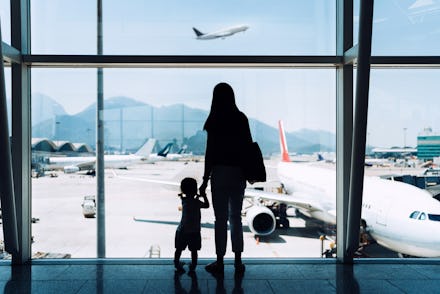How the Delta variant could mess with your summer travel

It wouldn’t be Hot Vax Summer without finally getting to jet off somewhere. And now, with much of the country reopened, we’ll have way more opportunities for revelry at our destinations than we did this time last year. But the spread of the Delta variant is reminding us that the panny isn’t over yet — which means that we still can’t travel quite as freely as we used to. Here’s how the Delta variant could mess with your travel plans.
Let's start with Chicago, since there's buzz around their new protocols. CNN reported that the city has had a travel advisory requiring a negative COVID-19 test or quarantine for visitors from states with more than 15 cases per 100,000 residents. No states have been on the list for the past several weeks — until Tuesday, according to Newsweek, when the Chicago Department of Public Health (CDPH) added Arkansas and Missouri. Arkansas has documented roughly 19.2 cases per 100,000 residents a day, while Missouri has reported around 21.2, both of which exceed Chicago’s infection rate threshold, the outlet reported.
The CDPH advises unvaccinated visitors from Arkansas or Missouri to get a negative COVID-19 test result no more than 72 hours before arriving in Chicago, according to Newsweek, or quarantine for 10 days once they arrive. Many other states, such as Louisiana, Wyoming, and Florida — all of which have reported more than 10 cases per 100,000 residents a day — could very well join Arkansas and Missouri on Chicago's list. You can check the city’s website for updates.
The changes to Chicago’s travel advisory come as the highly contagious Delta variant sweeps through the U.S., Newsweek reported. Based on CDC data, nearly 30% of COVID cases in Missouri are due to Delta, making it the state with the highest percentage of Delta cases. Per the state’s health department, less than half of Missouri residents are vaccinated. Indeed, Delta, now the dominant strain in the U.S., “is currently surging in pockets of the country with low vaccination rates,” CDC Director Rochelle Walensky said in a press briefing, per Newsweek.
A handful of other places in the U.S. also have new COVID-19 restrictions. For one, you’ll need a negative test to travel to Hawaii if you aren’t fully vaccinated. Visit Hawaii’s COVID-19 portal for more details (and if you do book a trip to the islands, please don’t be the entitled asshole tourist that locals have been complaining about lately).
If you’re unvaccinated and not from Maryland or Virginia, you’ll need to take a test 1 to 3 days before visiting DC, if you plan to stay for more than 24 hours, per DC’s latest travel status update. For everywhere else, CNN has a list of travel restrictions in each state.
Maybe you're considering a vacay in Europe, now that the E.U. has added the U.S. to its "safe list" of countries, as the New York Times reported. Since requirements vary from country to country, and can frequently change, the newspaper suggests checking the criteria for your destination before you book your travel. France requires a negative COVID-19 test from unvaccinated travelers from the U.S. within 72 hours of departure, CNN reported — but Italy allows U.S. travelers to enter only if they're fully vaccinated, or if they arrive on a COVID-tested flight.
As Dr. Anthony Fauci recently told NPR, the vaccines do protect against Delta, and getting them into enough people can prevent potentially scarier mutations from emerging. In the meantime, get vaxxed if you haven’t already, continue to take precautions against COVID-19 even when you travel, and follow any restrictions at your destination. There's a handy-dandy map that the CDC provided that can clue you in on which variants are dominant in which regions, currently. We could all use a vacation after the year-and-a-half we've endured — so go ahead, enjoy yourself, but that doesn't mean you have to throw all caution to the wind.